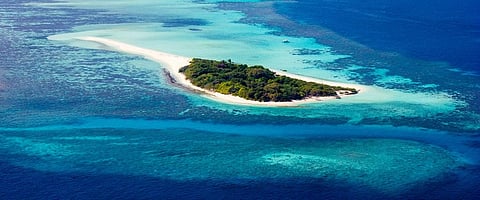

In a world where some national leaders like the United States President Donald Trump and Brazilian President Jair Bolsonaro do not want to take any action on climate change, there are some nations that are on the brink of extermination. These are the atoll nations.
Most of these nations are made up of atolls — ring shaped group of coral reefs, islands or a series of islets — and are the first to bear the brunt of global warming, like rising sea-levels and extreme weather events like tropical storms. For some of them, the consequences are not in the future but immediate.
Although all the 57 small island countries across the world have been recognised as vulnerable to climate change, the atoll nations are in grave danger because of thinner land mass, low elevation (on average 2 metres) and non-availability of higher ground.
The atolls are created by the action of underwater volcanoes called seamounts. Following the eruption, the lava settles down on the sea surface. With the continued eruptions, the volcano gets elevated until it breaches the surface of the ocean. This upper part of the seamount becomes an island, but is usually only a few metres above the ocean surface.
In the next stage, a type of corals with hard exoskeletons known as hermatypic corals start growing around the island forming a ring. This gives rise to a lagoon with outlets into the ocean that can get easily affected by the sudden rise in sea water during storm surges, apart from the general rise due to global warming.
The layers of lava do not form a thick and stable land mass and thus makes the atolls extremely vulnerable to erosion.
The atoll nations of Kiribati, Maldives, the Marshall Islands and Tuvalu have called for immediate action “to combat the impact of land loss, beach erosion, loss of fisheries, and water shortages”, at the conference on resilient atoll nations in productive oceans organised by the Asian Development Bank (ADB) on August 27, 2019.
“Dialogues such as this event are vital so that the affected atoll nations can voice their needs and share their experiences for staving off the threat of climate change posed to them,” said Takehiko Nakao, president of ADB.
The ADB is helping these atoll nations to cope with climate change pressures. Their work includes increasing the understanding of climate change and its consequences, making development more resilient and giving technical and financial support.
For this ADB has opened up avenues of financing climate change mitigation and adaptation projects through the Green Climate Fund (GCF), administered by ADB and grants by the World Bank.
For example, in Kiribati, a desalination plant that is largely powered by solar energy has received a $13 million grant from ADB. The bank is also supporting the atoll nations to achieve their nationally determined contributions (NDCs) under the Paris Agreement on climate change.
Recognising the urgency and importance of the issue, ADB will also support a third atoll adaptation dialogue at the next Conference of Parties in Santiago, Chile, in December 2019 under the United Nations Framework Convention on Climate Change.
But, a lot more needs to be done in order to make sure that the atoll nations are able to tide over the immediate threats of global warming as they are the world’s early warning system for climate change consequences and a lot can be learnt from their experience.